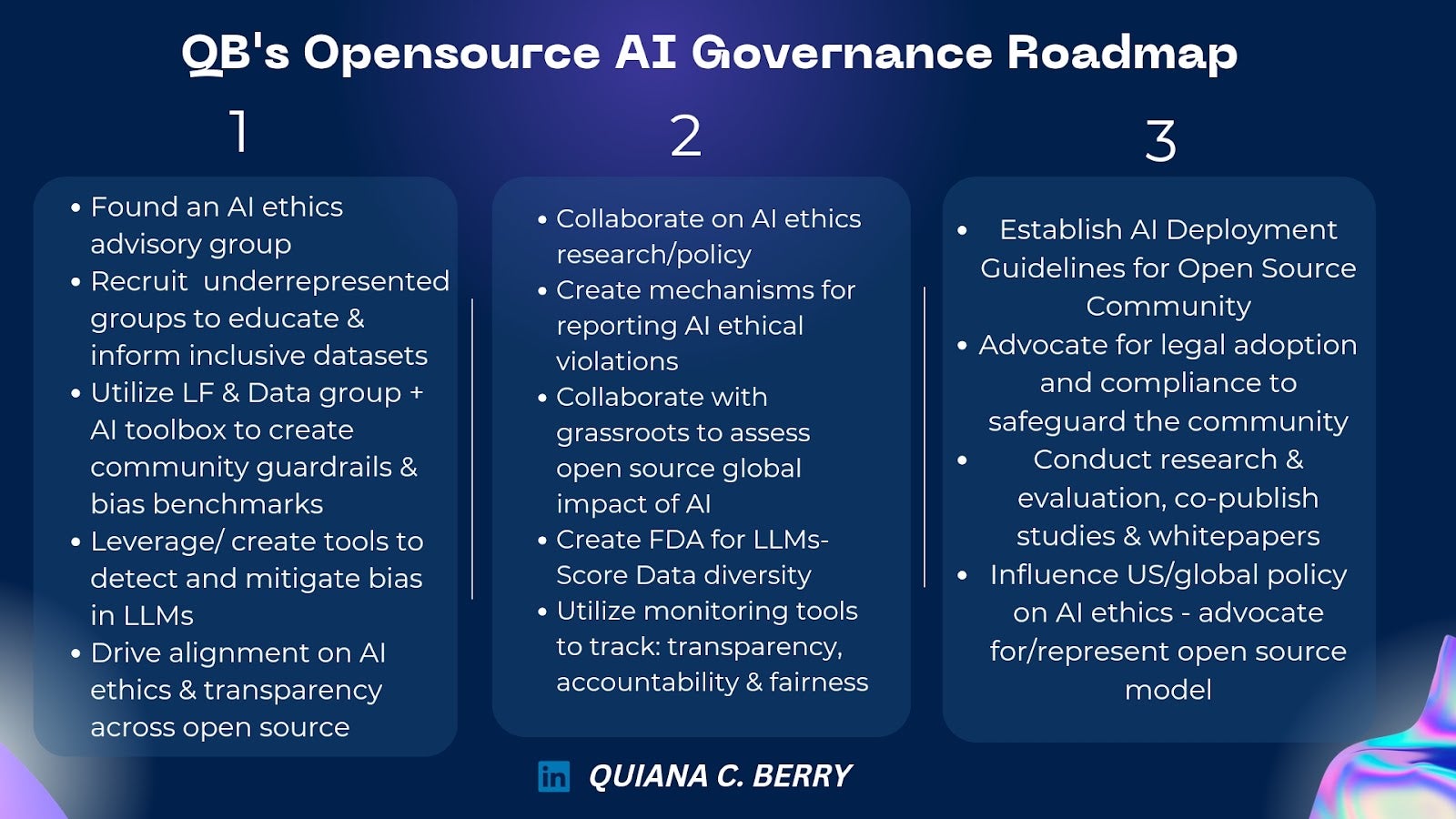At the Linux Foundation (LF) Open Source Summit in Vancouver, Quiana Casandra Berry, Technical Product Manager at Red Hat, delivered a thought-provoking session titled “Is ChatGPT the Enemy of Diversity?”. In this post, we will share the key insights from Quiana’s session, the importance of diversity, equity, and inclusion (DEI) in shaping AI policy and governance and what the AI & Data community is doing to bring attention to DEI. (You can read Quiana’s complete article here and connect with her on LinkedIn here)
The Power of Diversity in AI
The benefit of diversity and inclusivity in open source is supported by robust data and evidence. Numerous studies have demonstrated that diverse teams outperform homogeneous teams in terms of innovation, problem-solving, and overall performance.
Now, more than ever, it is imperative that we prioritize the inclusion of diverse communities in the wake of the AI revolution. Failure to do so risks perpetuating the marginalization and exclusion of people of color (PoC) by these technologies. By actively involving diverse voices in AI development and decision-making processes, we can strive for equitable outcomes and mitigate the potential for bias and discrimination.
It is our responsibility to ensure that AI technologies deployed in open source communities are designed and deployed in a manner that respects and upholds the rights and interests of all individuals, regardless of their background or ethnicity. In essence, inclusivity becomes the key to combating biases and ensuring that AI systems foster fairness and equal opportunities for everyone.
Promoting Diversity and Fairness with the power of Open-source
AI Fairness 360, a project initiated by IBM, and is just one great example of what commitment looks like towards promoting diversity and fairness in AI. This open-source toolkit provides developers with the means to assess and mitigate bias in AI models, enabling them to build more equitable systems. By leveraging the power of open-source toolkits like AI Fairness 360, organizations can proactively address ethical and fairness concerns associated with AI, while promoting transparency and accountability.
Specialized Working Groups: Shaping AI Policy with Diversity in Focus LF AI & Data
As a prominent community in open source AI, LF AI & Data group can shape AI policy by founding a specialized working group dedicated to AI Ethics and Policy within the context of Open source ecosystem to ensure there is alignment across open source projects. Additionally, by engaging early with policymakers, researchers, and diverse communities, LF AI & Data can create protective policies that mitigate the adverse effects of AI on communities globally while protecting the interests of the open source community.
This collaborative approach ensures that the voices and experiences of BIPOC (Black, Indigenous, and People of Color) communities are heard and actively included in shaping the future of AI policy and regulation. By incorporating diverse perspectives, we can address the historical biases and systemic injustices that have disproportionately affected these communities. This inclusive process fosters a more equitable and representative approach to AI development, ensuring that all members of society share the benefits and impacts of AI, regardless of their racial or ethnic backgrounds.
Benefits of DEI Practices in AI Governance
Implementing DEI (Diversity, Equity, and Inclusion) practices in AI governance has several significant benefits. Firstly, it is a powerful tool to mitigate biases that AI algorithms can perpetuate. By actively incorporating diverse perspectives and inclusive datasets, we can minimize the potential for biased decision-making, ensuring that AI systems operate fairly and impartially for all individuals. Secondly, DEI practices in model creation result in AI systems that effectively address the specific needs of marginalized communities. By actively involving these communities in the development process, we can create AI technologies that are finely tuned to cater to their unique requirements and challenges, leading to more inclusive and impactful outcomes.
Ethical AI Impact Assessments
We can’t fix what we don’t track. Ethical AI impact assessments are a crucial aspect of DEI implementation. These assessments, integrated throughout the AI development lifecycle, help identify biases and unintended consequences. We can build fair and reduce harmful AI systems by mitigating bias at the source.
More recommendations:
 Conclusion
Conclusion
Open-source tools like IBM’s AI Explainability 360 enhance transparency, accountability, and efficient bias identification. DEI practices in AI governance foster transparency, collaboration, and accountability. Open-source AI groups, like LF AI & Data, empowers diverse voices to shape technology and could create specialized group to steward AI ethics. As with any open source project, the more the code and algorithms being open for scrutiny and broad participation ensure transparency and alignment with the needs and values of diverse communities. Implementing inclusive AI models and governance ensure the creation of fair and ethical AI systems. By embracing diversity, we contribute towards shaping AI for the benefit of all.
To explore Quiana’s recommendations to the open source community and the feedback received during the talk, please read her article here.
What can you do to support DEI Initiatives? Join The Linux Foundation at these upcoming events and meet Quiana Berry at the Grace Hopper Celebration as she is a keynote speaker at the Open source hackathon.
- Black Is Tech Conference (Aug 7 – 11, Atlanta, GA)
- Grace Hopper Celebration (Sept. 26 – 29, Orlando, FL) –
- Society of Hispanic Professional Engineers (SHPE) (Nov 1-5, Salt Lake City, UT)
